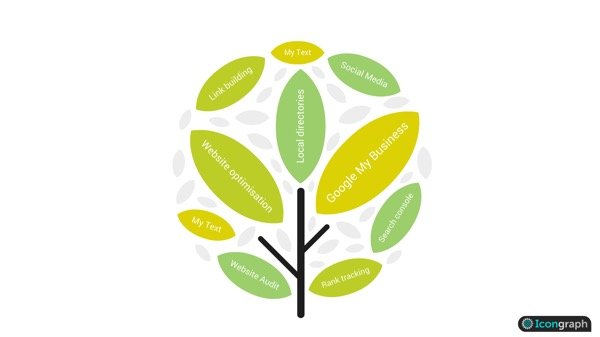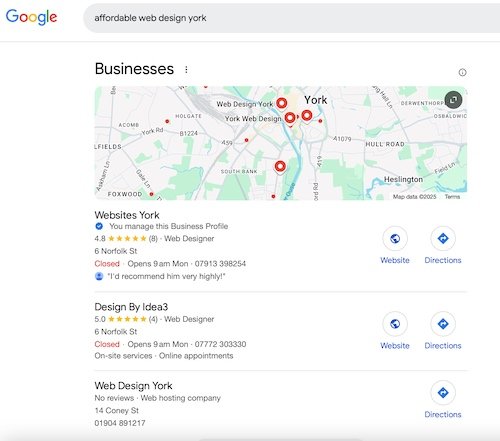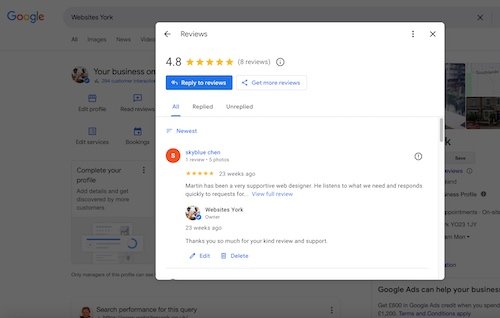Key steps to improve your business visibilty and your website rankings.
Local SEO (Search Engine Optimisation) is about optimising your online presence so that your business appears in local search results when people search for products or services near them. For small businesses, local SEO can make a huge difference in attracting nearby customers. Here are some actionable steps to help you get started:

1. Claim and Optimise Your Google Business Profile
Assuming that you have a fixed physical location, this is a no brainer for any business and it is free. All you need is a Google account. Your location doesn't necessarily need to be a shop, an office or a workshop. A lot of businesses are run from home remotely. A Google Business profile will quite literally put you on the map and optimised well, may also show up before any other listings in the Google search results page for someone searching for a product or service in their own local area.

The Google search results page showing Google business profile entries before other listings.
- Claim your business profile listing. Go to business.google.com and claim your business listing if you haven't already.
- Complete all the fields shown. Ensure that your business name, address, phone number, website, and business hours are accurate and consistent.
- Choose relevant categories. Select the categories that best describe your business.
- Add high-quality photos. Businesses with photos get 42% more requests for directions and 35% more click-throughs to their websites.
- Check your entry on Google maps
- Collect reviews. To find the link to send to your client, go to Google business profiles and sign in with your Google account. Find your profile and click on the reviews link. From there you will find a button that says get more reviews. Use that link and send it to your customers. I make a point of responding to all reviews even if they are negative. I have had one person who I have never heard of leave me a 3 star review with no explanation and they didn't respond to my response to them. I guess this is just one of the pitfalls of getting reviews that we all have to live with.

How to find the link to send to your client so that they can easily fill in a Google review for your business.
2. Optimise Your Website for Local Search
Your website should be optimised to show up in local search results and provide a great user experience.
- Include local keywords: Use keywords related to your business and location. For example, “best pizza in York” or “plumber near Southbank”.
- Create location-specific pages: If your business has multiple locations, create separate pages for each one with local content (e.g. specific contact info, maps, testimonials).
- Add your NAP (Name, Address, Phone Number): Ensure this information is displayed clearly on your website, preferably in the footer of every page.
- Use structured data (schema markup): Add LocalBusiness schema to your website to help search engines understand your business details. This can improve your chances of appearing in local rich snippets.
- Mobile Optimisation: Ensure your website is mobile-friendly. More than 50% of local searches are now being done on mobile devices so having a mobile friendly website is a must in 2025. I still find websites which although they work on a mobile, I have to keep zooming in to be able to read the text and am constantly expanding and contracting the screen size to cope with the shortcomings of the website design.
The technical optimisation of your website is quite a specialist job. The items that are opportunities to introduce keywords that you wish to rank for include:
- Browser title, Meta Title and Meta Description
- Headings especially Header 1
- The text content itself should contain multiple instances of the keyword you are targeting BUT you can overdo it so you need to know how many times you can repeat the same keyword before this is recognised as keyword stuffing. (The days of websites that have keywords on every line possible, all over the site are long gone and the old practise of stuffing pages full of keywords is no longer going to work).
- Image alt tags
- Structured data
Getting the balance right is critical for a page to work for a given keyword so tools can help to review a page and determine whether there are any missed opportunities or if there is a danger of having too many keywords on a page.
Generally the more text you have on a page, the better - but it needs to be written in a way that is relevant, authoritative and grammatically correct but also easily understood by the average high school student. It needs to have as little jargon as possible.
3. Get Local Listings of your website.
These are mentions of your business (Name, Address, Phone number) on other websites. Having consistent listings across high-quality local directories can increases authenticity which in turn can improve your local rankings.
- Ensure NAP consistency: Ensure that your business name, address, and phone number are consistent across all platforms.
- Submit to local directories: Get listed on reputable local directories like Yelp, Yellow Pages, and other niche directories relevant to your industry.
- Local Chamber of Commerce: If applicable, get listed on your local Chamber of Commerce website.
4. Create High-Quality, Locally Relevant Content on your website
Creating content that is relevant to your community can help you stand out in local searches.
- Local blog posts: Write about local events, partnerships, news, or activities related to your business.
- Local keywords: Use keywords like “in York” or “near York” naturally within your content.
- Create location-based landing pages: If your business serves different locations or neighbourhoods, create specific pages for each area with content that is relevant to your location.
5. Build Local Backlinks
Backlinks (links from other websites to yours) are an important ranking factor. Getting local backlinks can significantly improve your visibility in local search.
- Partner with local organisations: Sponsor local events, charities, or collaborate with other local businesses to earn backlinks.
- Guest blogging on local sites: Write blog posts for local websites or media outlets that are relevant to your business.
- Local press: Get featured in local newspapers, magazines, or online publications.
6. Engage on Social Media
Social media activity can indirectly help with local SEO by driving traffic and engagement.
- Focus on local platforms: If your city or region has any hyperlocal platforms (e.g., Nextdoor), make sure you're active there.
- Geo-tagging: When posting on social media, use location tags to help your business appear in location-based searches.
- Encourage check-ins: Ask your customers to check in or tag your business in their posts, as this can help with local visibility.
7. Encourage and Manage Customer Reviews
Reviews are crucial for local SEO and can directly influence a potential customer’s decision.
- Ask for reviews: Encourage happy customers to leave positive reviews on Google, Yelp, and other review platforms.
- Respond to reviews: Respond professionally to both positive and negative reviews. Acknowledging reviews shows that your business cares about feedback.
- Monitor review sites: Regularly check review sites for new feedback and promptly address any concerns.
8. Use Structured Data (Schema Markup)
Schema markup helps search engines understand your website's content more clearly. It can also help you get featured in rich snippets, which appear at the top of search results.
- Add LocalBusiness schema: This tells Google exactly who you are, where you're located, and what services you offer.
- Other schema types: Consider adding other schema types like FAQ or product schema to your pages, dependingon the type of content you have.
9. Track and Measure Your Local SEO Performance
Use analytics tools to track how well your local SEO efforts are working.
- Google Analytics: Monitor traffic to your website and see how much is coming from local searches.
- Google Search Console: Check search queries that bring users to your site and monitor any issues related to local searches.
- Track rankings: Use local ranking tools (like BrightLocal or Whitespark) to see how your business ranks for local keywords.
10. Engage in Local Link Building
Building relationships with local businesses, influencers, and organisations can help you earn backlinks and mentions.
- Collaborate with local influencers: Work with local bloggers or influencers who can feature your business and link back to your website.
- Get involved in the community: Sponsorships, hosting local events, or partnering with charities can get you featured on local news sites and blogs, building backlinks and visibility.
11. Leverage Voice Search Optimisation
As voice search becomes more common, especially with mobile devices and smart speakers, optimising for voice queries can help you get discovered by local searchers.
- Use conversational keywords: Voice searches are more natural and conversational. Think about what people would ask, such as “Where is the best pizza near me?” or “How do I find a good plumber in York?”
- Answer common questions: Create FAQ sections on your website that answer questions people may ask about your business.
By focusing on these key local SEO strategies, you can help your small business get discovered by customers who are nearby and searching for what you offer. Local SEO is all about making sure you’re visible where it matters most—right in your local community!
You may need your web designer to deliver some of the technical parts of this plan but there is a lot you can do on your own to drive your own engagement with prospective customers.
Content creation
If your website allows it, make use of the Content Management System to create your content and add new blog posts. Bear in mind the sort of keywords you are trying to be found for and engage with your web developer to see if the content you are creating is the sort of content that will directly benefit you.
Be wary of just copying what an AI tool gives you. For a start, an AI tool will probably be showing you content that it has found already online which means that someone else has already written it. Google actively discourages AI written content or indeed any duplicated content. If you do use an AI tool then you would be well advised to reword and add your own perspective to it so that you are building content based on your own knowledge and experience.